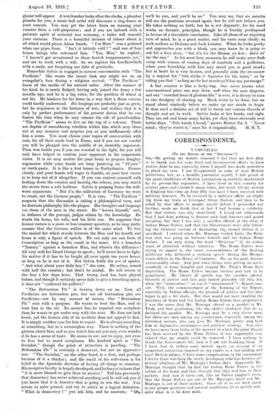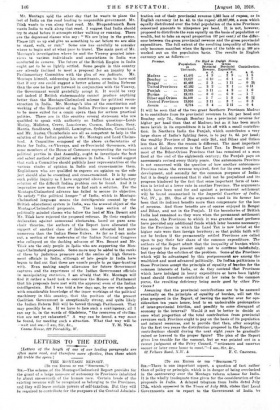CORRESPONDENCE.
UNMUZZLED.
[To THE EDITOE or THE "SPECTATOR."] Sni,—On getting my muzzle removed I feel that my first duty is to thank you for your kind and disinterested efforts to have justice done to me, especially when I myself Was made powerless to plead my case. I am disappointed in some of your British politicians, but, as a hurcible journalist myself, I feel proud of the great traditions of British journalism so worthily maintained by its present-day exponents. I have lived in this country for several years and visited it many times, but never till my arrival in England this time on June 19th last have I been received with military honours. To be received by a military officer on alight- ing from my train at Liverpool Street Station. and then to hi asked by that officer to muzzle myself before I proceeded any further, made me think that at last I had become a celebrity. But that elation was only short-lived. I found out afterwards that I had done nothing to deserve such high honours and grand reception, but that I was only a sacrifice offered at the altar of Indian Home Rulers, and, that the Government were only follow- ing the Oriental custom of decorating the animal before it is sacrificed. 1 noticed when Mr. Montagu visited India tho flirta- tion that was going on between himself and the Indian HOTHP Rulers. I am only using the word " flirtation " in its widest sense of attention without intention. The Home Rulers were trying to appeal to the sweet reasonableness of (the dashing politician who delivered a striking speech during the Mesopo- tamia debate in the House of Commons. Ito, on his part, became unreasonably sweet. And just when things were getting on nicely somebody at home bungled and stopped Ur. Tilak's Home Rule deputation. The Home Rulers became furious and had to ha propitiated. My liberty of speech was the sacrifice offered. Grounds of justice and fair play looked plausible till July 5th., when the "momentous "—or was it "monumental "P—Report CHHO out. With the commencement of the booming of the Report. especially by Indian officials, the grounds of justice and fair play began to get a bit shaky. But that would not have troubled the Secretary of State had the Indian Home Rulers been propitiated. I was the pawn that Mr. Montagu offered as a gambit to Mr. Tilak, and that gentleman, like the skilful strategist that he is. declined the gambit. Mr. Montagu may be a very clever man, but there are men among my countrymen, especially among the extremist section, who can give Mr. Montage points and beat him in diplomatic cunningness and political strategy. Now that we have news from India of the manner in which the great Report has been received by the Home Rulers, it was apparently con- sidered that my muzzle could be removed. I have nothing to thank the Government for, and so I am not thanking them. If I have had to endure some mental agony on account of an unmerited restriction imposed on my rights as a law-abiding and loyal British citizen, I have some compensation in the amusement
I derive from watching the newly developing relations between old mutual admirers of Mr. Montagu's Indian days. Apparently Mr.
Montagu thought that he had the Indian Home Rulers in the
hollow of his hand, and they thought that they had him in their pockets. And now it turns out like an Indian juggler's trick. that the Home Rulers are out of Mr. Montage's hand and Mr. Montagu is out of their pockets. Since all of us are back again in our proper positions and natural conditions, let us quietly con- sider what is to be done next. Mr. Montagu said the other day that he wants to place the reet of India on the road leading to responsible government. Mr. Tilak wants to run along that road. Mr. Bhupendranath Bass wants India to walk along that road. I suggest that India should try to stand before it attempts either walking or running. There are the depressed classes who say : " We are lying in the gutter. Please lift us up and give us something to eat before we are able to stand, walk, or run." Some one has carefully to consider where to begin and at what pace to travel. The main part of Mr. Montagu's investigation where he and the Viceroy granted inter- views to various individuals and associations in India was conducted in camera. The future of the British Empire in India ought not to be so lightly settled. Some people in this country are already inclined to meet a proposal for an inquiry by a Parliamentary Committee with the plea of res indicate. Mr. Montagu himself, addressing his constituents, seems to have said that if any one could suggest a better scheme of Indian Reforms than the one he has put forward in conjunction with the Viceroy, the Government would gratefully accept it. It would be very sad indeed if British statesmanship cannot produce anything better than the Montaga-Chelmsford scheme for political recon- struction in India. Mr. Montagu's idea of the constitution and working of the Executive of an Indian Province appears to me to be more suited for a comic opera than for serious practical politics. There are in this country several statesmen who are qualified to speak with authority on Indian questions—Lords Morley, ifidleton, Crewe, Lansdowne, Curzon, Haodinge, Rosy, Harris, Sandhurst, Ampthill, Lamington, Sydenham, Carmichael, and Mr. Austen. Chamberlain are all as competent to help in the solution of the Indian problem as Mr. Montagu and Lord Chelms- ford. A Committee composed of the above ex-Secretaries of State for India, ex-Viceroys, and ex-Provincial Governors, with some members of the House of Commons representing the various political parties in that Assembly, ought to investigate the best and safest method of political advance in India. I would suggest that such a Committee should publicly hear representatives of the various shades of opinion in India and cross-examine them. Englishmen who are qualified to express an opinion on the sub- ject should also be examined and cross-examined. It is by some such public inquiry as I have suggested above that a satisfactory solution of the difficult Indian problem can be found. And it is imperative now more than ever to find such a solution. For the Montagu-Chelmsford advance has failed to secure its objective. To satisfy "the political hunger" of India, which in Montagu- Chelmsford language means the intelligentsia created ley the British educational system in India, was the avowed object of the MoiatagueChelmeford proposals. The large section of the politically minded classes who follow the lead of Mrs. Elegant and Mr. Tilak have rejected the proposed reforms. By their emphatic declaration against communal electorates, based on pure arm- chair theories, the authors of the Report have alienated the support of another class of Indians, lees educated but more numerous than the Indian Home Rulers. As far as I can make out, a section of the moderates of the Indian National Congress who collapsed on the dashing advance of Mrs. Besant and Mr. Tilak are the only people in India who are supporting the Mon- tagu-Chelmdord proposals. Some more may be added to the ranks of these by judicious pressure and the smiles of high Govern- ment officials in India, although of late people in India have begun to find out that these are unsafe people to go tiger-hunting with. Even making ample allowance for future Government captures and the expertness of the Indian Government officials in manipulating statistics, I am afraid that Mr. Montagu will find it rather a hard task to convince the Holmes of Parliament that his proposals have met with the approval even of the Indian intelligentsia. But I was told a few days ago, by one who speaks with considerable knowledge of the inner workings of the political machinery in this country, that the position of the present Coalition Government is exceptionally strong, and quite likely the Indian Reform Bill will be forced through Parliament. That may possibly be so. If we have to face such a contingency, all I can say is, in the words of Gladstone, "the resources of clothe», tion are not yet exhausted." A way can be found, a way must be found, for meeting such a situation. What that way will be



































 Previous page
Previous page